Zahner Lecture
Events
-
-
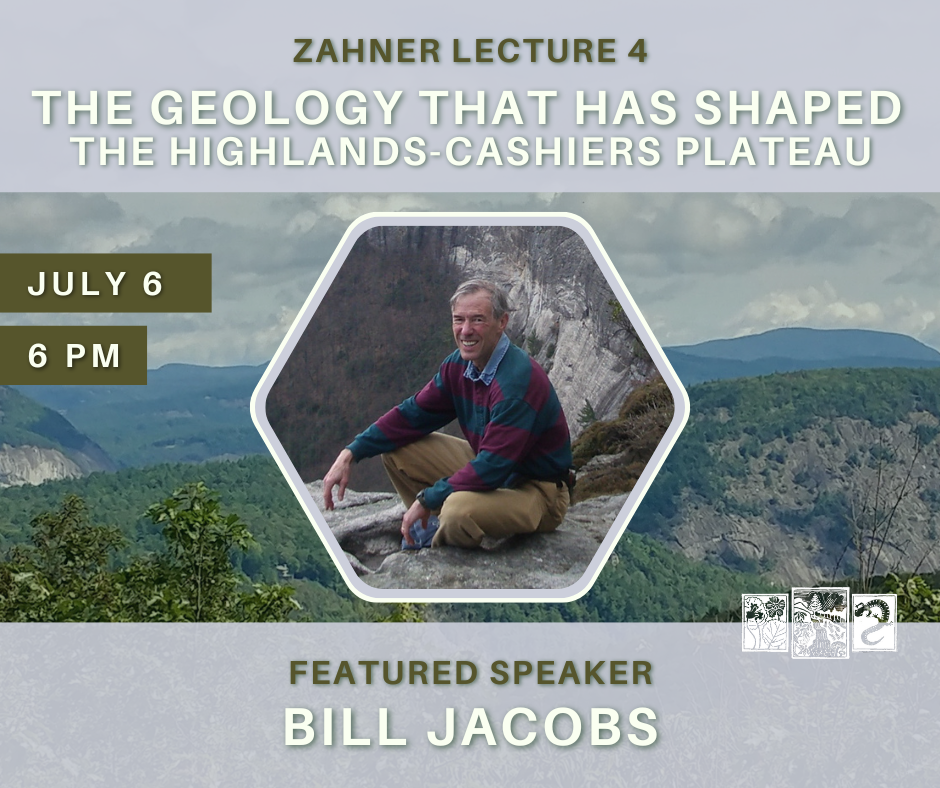
Zahner Lecture 4
Highlands Nature Center 930 Horse Cove Rd., Highlands, NC, United StatesLecture 4 - The Geology That Has Shaped the Highlands-Cashiers Plateau Featured Speaker: Bill Jacobs, Geology Enthusiast and Author of Whence These Special Places – The Geology of Cashiers, Highlands & Panthertown Valley Date: Thursday, July 6th Time: 6pm – 7pm Cost: FREE Sponsored by Anne & Dick Goodsell: The Claude Sullivan Geology Initiative The Highlands-Cashiers Plateau is a unique landscape, with high valleys, an extraordinary array of waterfalls and mountains, and rich biodiversity. In this lecture, we will explore the geologic processes, stretching back over 500 million years, that have created the Plateau and shaped today’s special landscape. Our speaker will use concepts and language comfortable for the non-scientist and will discuss how geology, some of it ancient and some much more recent, has determined the character and appearance of both the broader Plateau and many of its specific mountains and waterfalls.
Free -
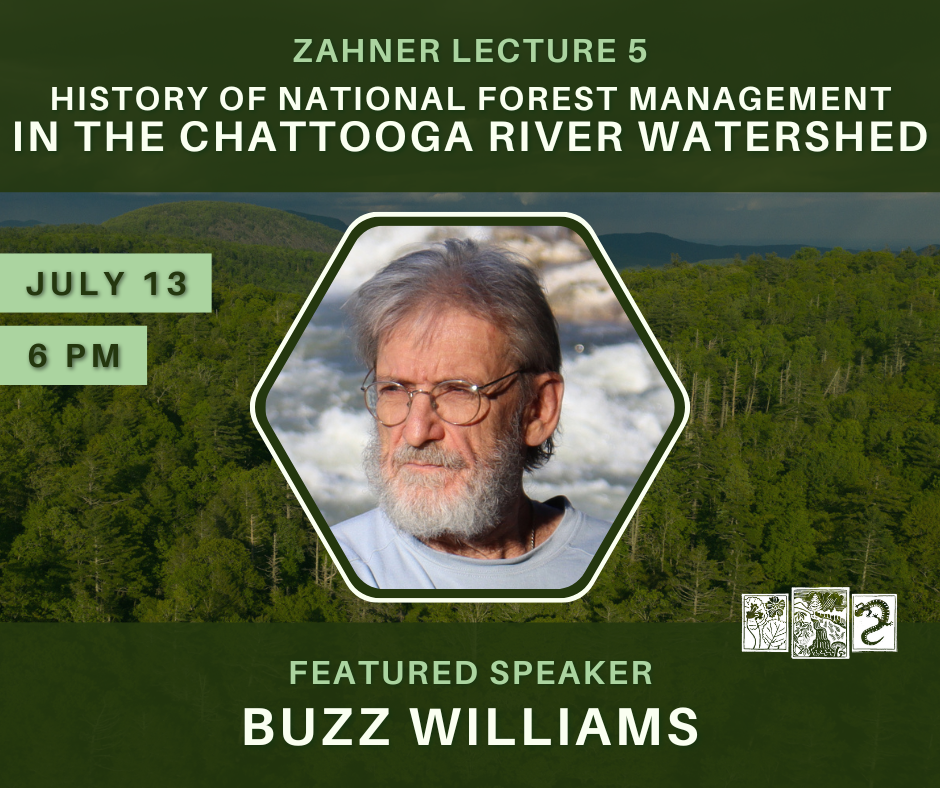
Zahner Lecture 5
Highlands Nature Center 930 Horse Cove Rd., Highlands, NC, United StatesLecture 5 - History of National Forest Management in the Chattooga River Watershed, and the Compelling Case for a New Mission for the Forest Service Featured Speaker: Buzz Williams; Emeritus Executive Director & Program Specialist, Chattooga Conservancy Date: Thursday, July 13th Time: 6pm – 7pm Cost: FREE Sponsored by Bryding Adams & Bob Rathburn, Lynda Anderson & Ken Conover, Margie Bauer & Jim Parker, Janet & Scott Clarke, Leslie & Jim Costa, Diane Lennox & Paul Manos, Helen & Russ Regnery, and Dollie Swanson. National forest lands in the Highlands-Cashiers Plateau encompass a very sensitive and ecologically rich landscape. These forests are critical for recreation, preserving biological diversity, protecting drinking water supplies, producing clean air—and now, for fighting climate change. These forests are managed by the Forest Service under the US Department of Agriculture and are subjected to intensive logging and cultivation as tree crops. Recently, the Forest Service decided to cut down rare old-growth trees and increase the amount of logging on public lands in western NC. Scientific research indicates that logging on federal forests is a substantial source of carbon dioxide emissions into the atmosphere. Recent studies also found that one of the best ways to mitigate the effects of climate change is by restoring and protecting mature and old-growth forest ecosystems, which store large amounts of carbon. This talk will provide an overview of national forest management in the Chattooga River watershed, and why mitigating the effects of climate change requires a new mission for the Forest Service—one that prioritizes protecting and restoring a network of mature and old-growth forest ecosystems, to ensure biological diversity and management aimed at fighting climate change.
Free -
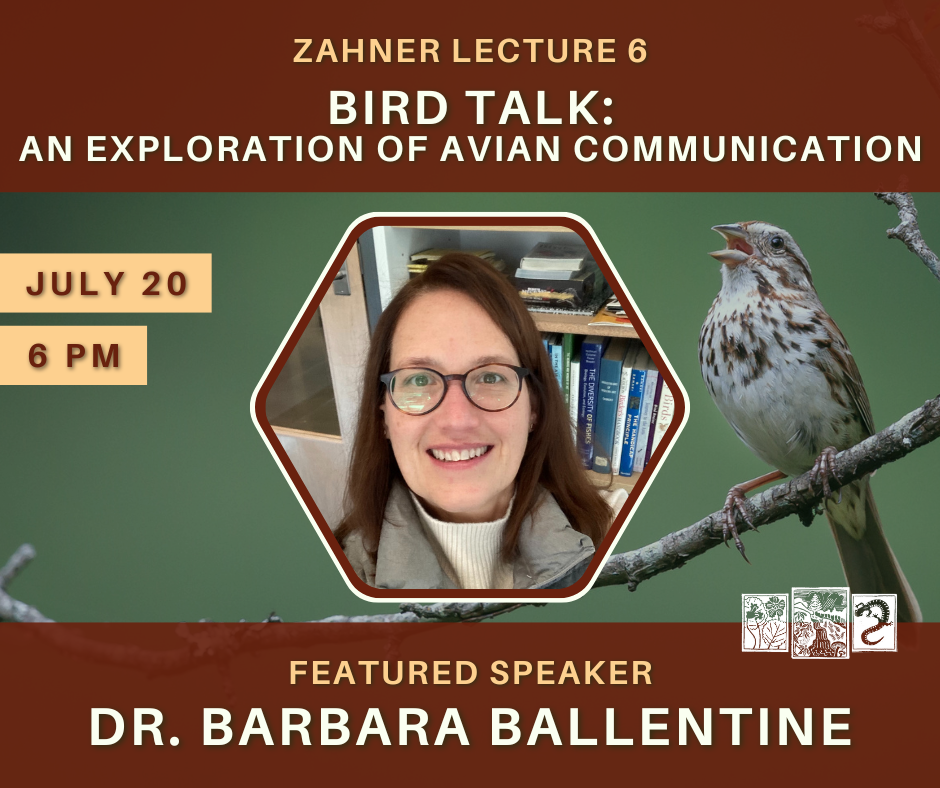
Zahner Lecture 6
Highlands Nature Center 930 Horse Cove Rd., Highlands, NC, United StatesLecture 6 - Bird Talk: An Exploration of Avian Communication Featured Speaker: Barbara Ballentine, Ph.D.; Associate Professor; Western Carolina University Date: Thursday, July 20th Time: 6pm – 7pm Cost: FREE Sponsored by Miriam & Vernon Skiles and Mary Todd & Jimmy Davis. Birds use acoustic, visual, and even olfactory signals in social contexts that are important for successful reproduction and survival. Signaling works because it offers advantages to both the sender and receiver. Understanding how signals are used by birds to communicate provides insight into the amazing lives of birds.
Free -
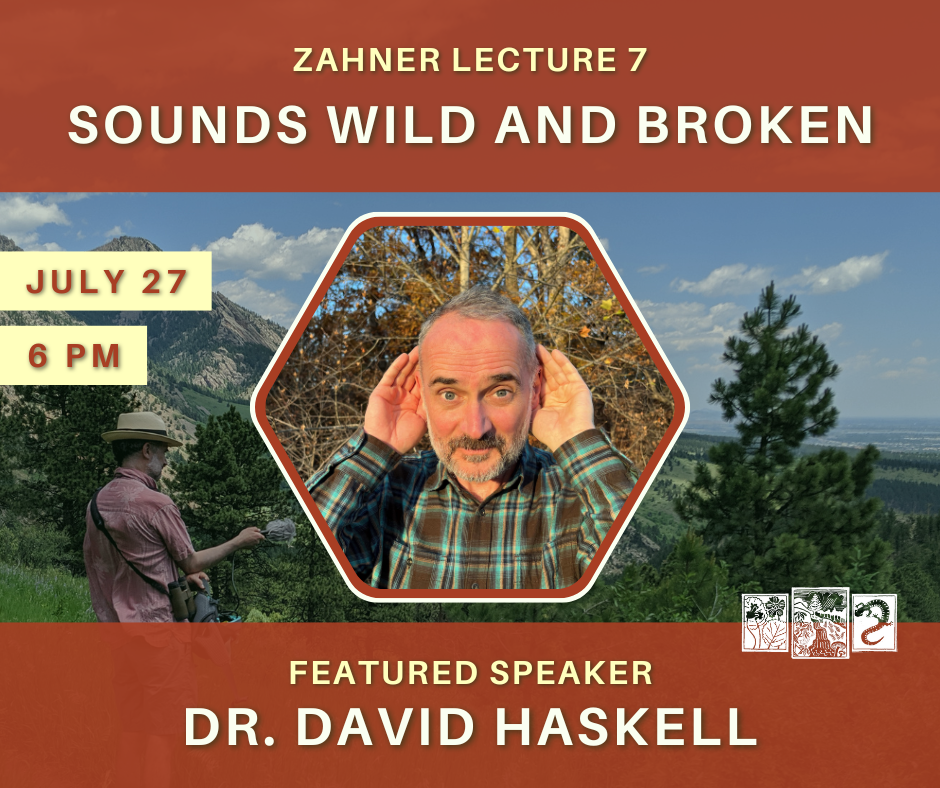
Zahner Lecture 7
Highlands Nature Center 930 Horse Cove Rd., Highlands, NC, United StatesLecture 7 - Sounds Wild and Broken Featured Speaker: David George Haskell, Ph.D.; Author and William R. Kenan Jr. Professor; University of the South Date: Thursday, July 27th Time: 6pm – 7pm Cost: FREE Sponsored by Rosemary & Bill Stiefel. Sonic communication was a late-comer to the evolution of life on Earth. But once song got started, the links that it forged became powerful generative forces. Today, the diverse sounds around us – from chirping crickets, to birdsong, to the human music in our earbuds – reveal the many layers of this evolutionary and cultural creativity. Yet sonic diversity is also threatened worldwide. Using examples from his own explorations of sound, Haskell will show how attention to the sensory richness of the world, especially its sonic dimensions, can root and guide exploration, ethics, and action.
Free -
-
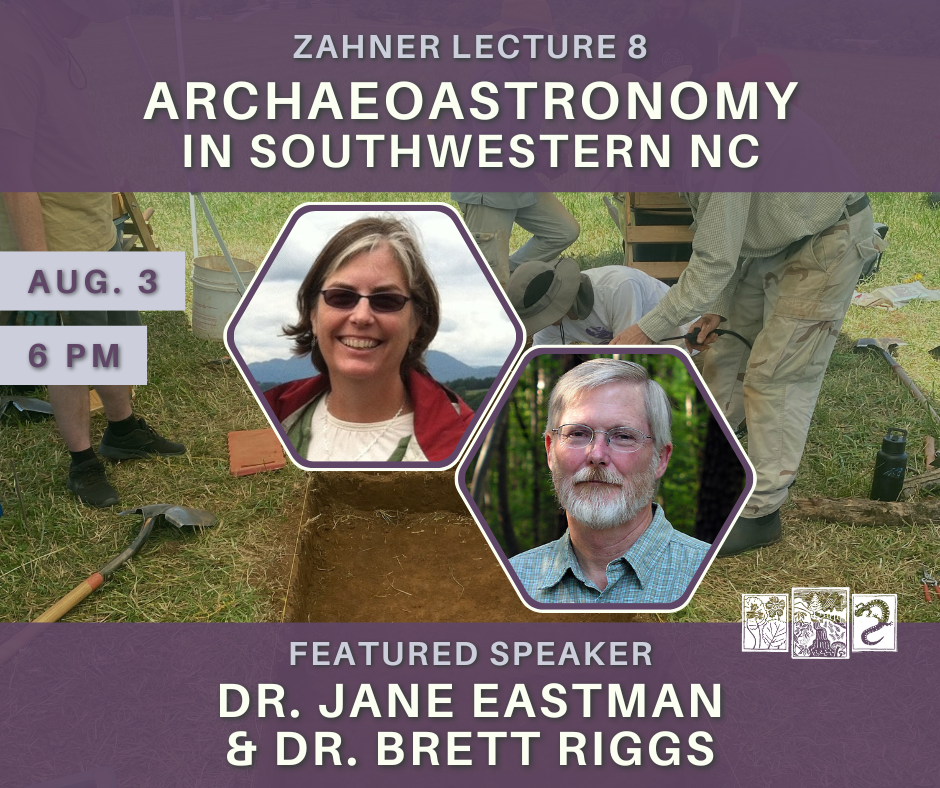
Zahner Lecture 8
Highlands Nature Center 930 Horse Cove Rd., Highlands, NC, United StatesLecture 8 - Archaeoastronomy in Southwestern North Carolina Featured Speakers: Jane M. Eastman, Ph.D.; Associate Professor; Anthropology and Sociology Department; Western Carolina University & Brett Riggs, Ph.D.; Sequoyah Distinguished Professor of Cherokee Studies; Western Carolina University Date: Thursday, August 3rd Time: 6pm – 7pm Cost: FREE Sponsored by Suzanne & Don Duggan, Julie Farrow, Florence & Tom Holmes, Ruthie & Franko Oliver, Adele & Nick Scielzo, and Margaret Waters. In ancient Cherokee perspective, the matters of this world, the Above World and the Beneath World intertwine, and Cherokee peoples constructed ritual landscapes to engage the beings and forces of these realms. Recent investigations in the Little Tennessee River Valley have revealed one such landscape that marks astronomical phenomena and bespeaks sophisticated systems for measuring calendrical time and the cycles central to Cherokee life. These patterns indicate complex observational sciences that guided functions of indigenous societies long before European contact.
Free -
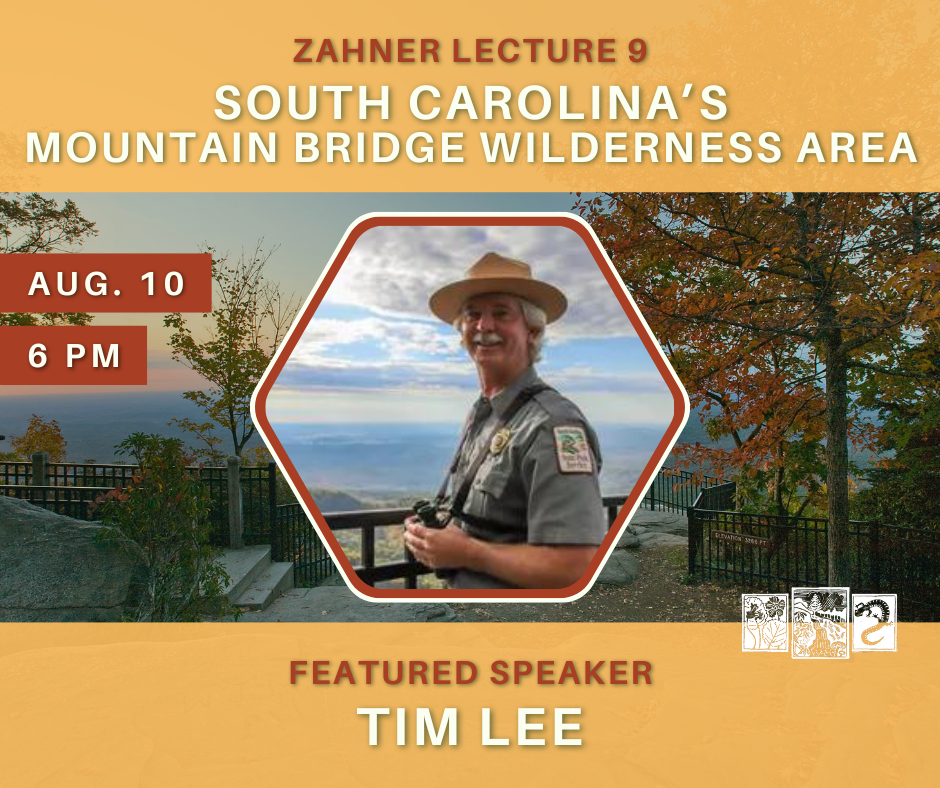
Zahner Lecture 9
Highlands Nature Center 930 Horse Cove Rd., Highlands, NC, United StatesLecture 9 - South Carolina’s Mountain Bridge Wilderness Area Featured Speaker: Tim Lee; Interpretive Ranger/Naturalist; Mountain Bridge Wilderness Area Date: Thursday, August 10th Time: 6pm – 7pm Cost: FREE Sponsored by Martha & Michael Dupuis, Monte & Palmer Gaillard, and Melanie & Tom Mauldin. Located in an area along the Blue Ridge Escarpment, the Mountain Bridge Wilderness Area provides a habitat for a diversity of biological communities adapted for life along the Blue Ridge Escarpment. With high average rainfall, diverse topography, and miles of streams and rivers many species found there are rare within the state and some are found in few other places in the world.
Free

Recent Comments